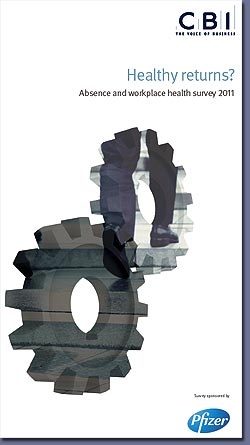 |
 |
|
Sickness Absence Remains Low Finds CBI Survey Sickness absence in 2010 remained close to the previous year's record low, employers' organisation CBI has found. The CBI/Pfizer Absence and Workplace Health Survey reports there were 190 million working days to sickness absence last year, with each employee taking an average of 6.5 days off sick. This compared to 6.4 sick days in 2009, the lowest rate since the survey began in 1987.
Furthermore, you would not think that the findings of this new survey represented an improvement from the headline used by the CBI press release: ‘WORKPLACE ABSENCE COSTING ECONOMY £17bn’ Nor of course do the CBI criticise the employer for not addressing the causes of workplace illness. Blaming GPs and the new Fit Note, Katja Hall, CBI Chief Policy Director, said: Commenting on the CBI findings, TUC head of safety Hugh Robertson said: “The report confirms that sickness absence is still close to the lowest level ever. It does not however address the growing problem of presenteeism where workers are coming in while ill. This has grown during the recession and is now a major problem.” He added: “The report also seems to put responsibility for sickness absence onto everyone but the employer who is responsible for managing it. As is the case every year, the CBI makes unsupported claims of levels of 'non-genuine' sickness absence. These are based, not on evidence, but on managers' perceptions, and should be taken with a pinch of salt." The survey can be downloaded in full from the E-Library Database using search term 'sick absence' Source: TUC Risks / CBI
|
